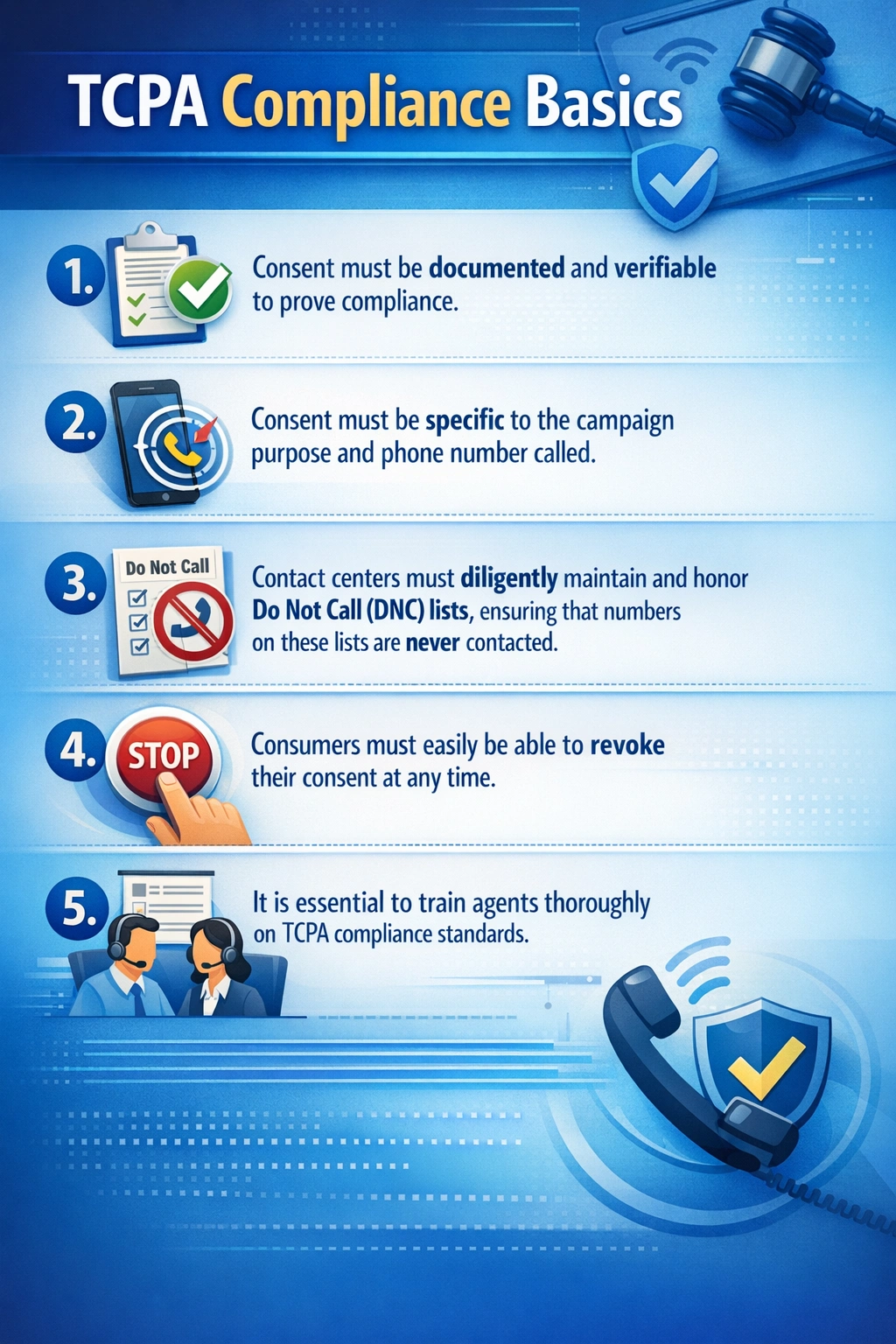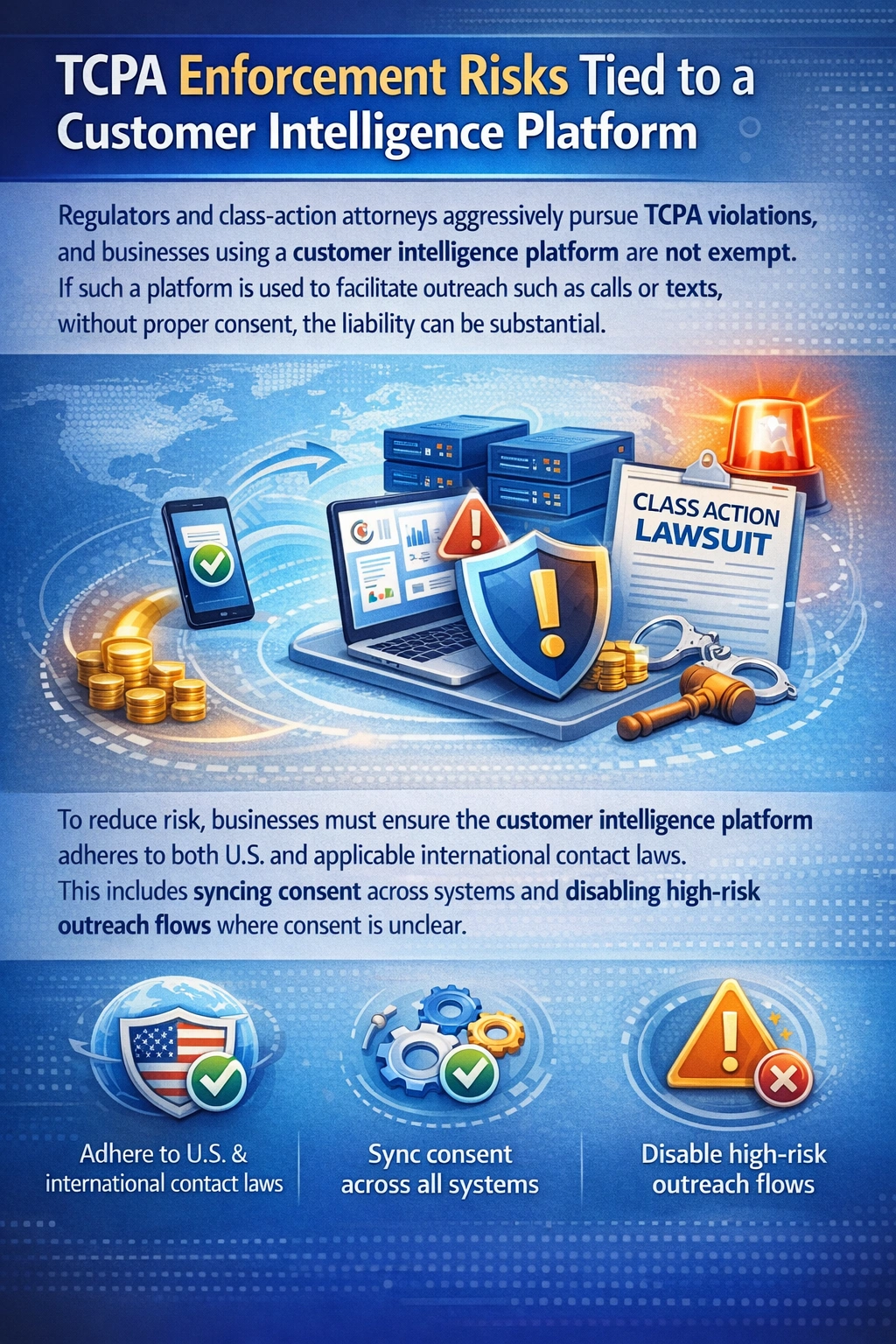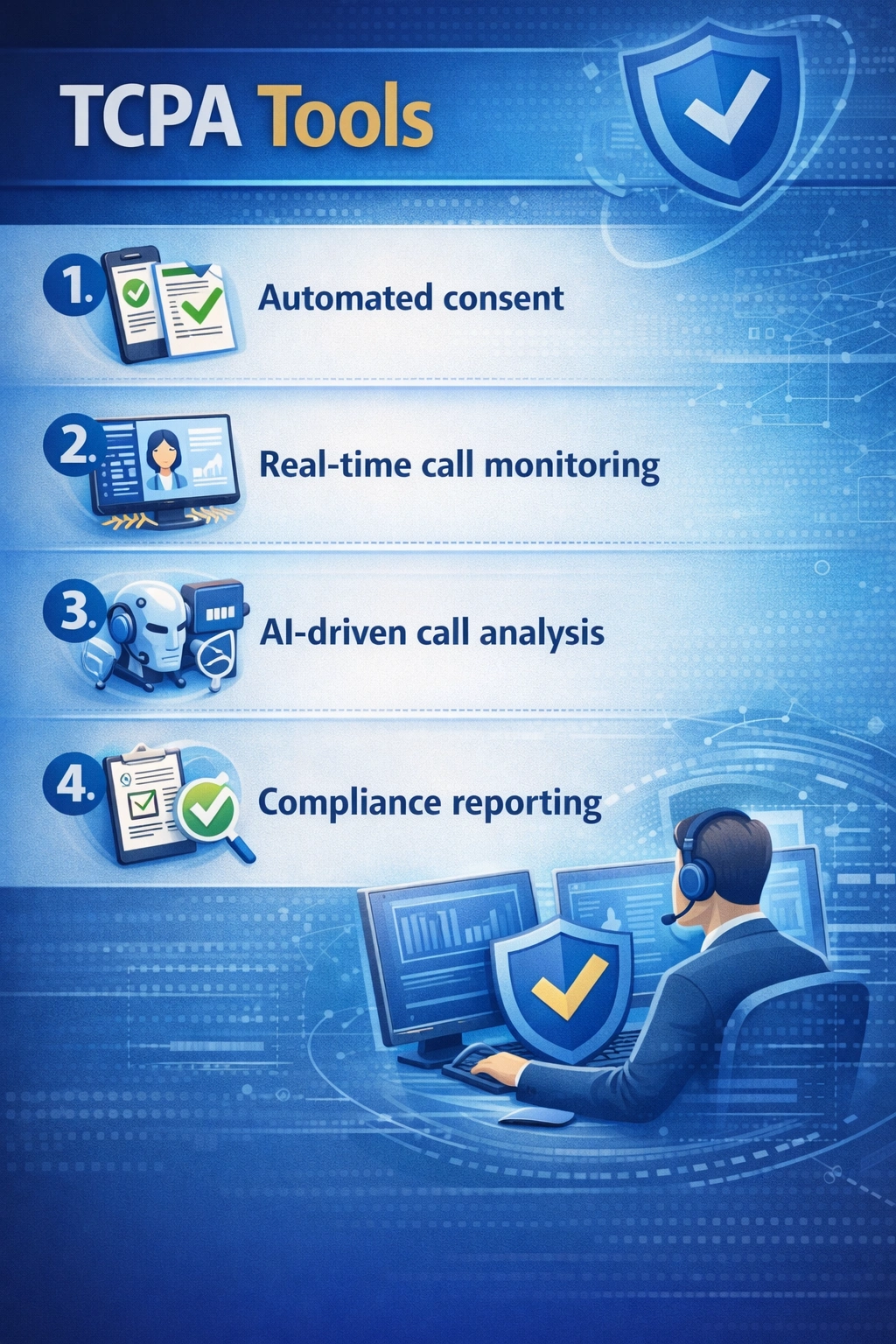The Telephone Consumer Protection Act sets strict rules for outreach, and using a customer intelligence platform requires careful compliance. From consent management to ethical outreach, aligning platform usage with TCPA regulations helps avoid fines and build trust. As laws evolve, how will your customer intelligence platform adapt to stay compliant and customer-focused?
Stay ahead of TCPA lawsuits—start with Convin.
Understanding the Telephone Consumer Protection Act
The Telephone Consumer Protection Act was created to shield consumers from intrusive phone and text marketing. Contact centers are major users of these outreach methods, so TCPA rules impact daily operations.
By understanding TCPA, contact centers can implement policies that avoid violations and maintain positive customer relationships. Knowledge of TCPA is foundational for compliance, efficiency, and ethical communication.
What Is the Telephone Consumer Protection Act?
The Telephone Consumer Protection Act, commonly called the TCPA, is a 1991 federal statute restricting how and when businesses can contact consumers via telephone.
Key provisions include:
- Limiting the use of autodialers and prerecorded messages
- Requiring prior express consent before calls or texts
- Establishing national Do Not Call (DNC) rules
- Restricting telemarketing call times to 8 a.m. to 9 p.m.
TCPA aims to protect consumer privacy while allowing businesses to communicate legally.
For contact centers, this means:
- Scrupulous consent collection and documentation
- Avoiding unsolicited calls and texts
- Monitoring call campaigns for TCPA compliance
Failing to meet these leads to lawsuits and regulatory fines.
What Entity Enforces the Telephone Consumer Protection Act?
The Federal Communications Commission (FCC) is the primary authority enforcing the Telephone Consumer Protection Act (TCPA). The FCC creates detailed regulations to clarify TCPA requirements and ensure consumer protection.
It actively investigates complaints filed by consumers regarding unwanted or illegal calls. When violations are found, the FCC can levy substantial fines and penalties on offending businesses or contact centers, helping to maintain fair telemarketing practices nationwide.
Contact centers must:
- Monitor FCC rulings and updates regularly to stay informed about the Telephone Consumer Protection Act regulations. This ensures contact centers adapt quickly and comply with evolving legal requirements.
- Respond quickly to consumer TCPA complaints by investigating issues promptly and taking corrective actions. Timely responses help prevent escalations, reduce penalties, and demonstrate a contact center’s commitment to ethical communication.
- Incorporate FCC compliance guidelines into daily workflows by training agents, updating scripts, and integrating automated compliance tools. Embedding these guidelines operationally ensures every call follows TCPA rules consistently and reliably.
The FCC's authority includes:
- The FCC imposes penalties ranging from hundreds to thousands of dollars for each TCPA violation.
These fines are a strong deterrent against non-compliance by contact centers and businesses.
- The FCC authorizes state attorneys general to initiate enforcement actions against violators.
This collaborative approach enhances TCPA enforcement across jurisdictions, increasing accountability and expanding the reach of consumer protection efforts.
- The FCC oversees TCPA compliance specifically in telemarketing and automated calling practices.
It monitors industry adherence to rules, investigates complaints, and updates regulations to keep pace with technological advancements and consumer needs.
Understanding FCC enforcement helps contact centers build robust compliance frameworks.
How the TCPA Affects a Customer Intelligence Platform
The Telephone Consumer Protection Act (TCPA) sets strict guidelines around how businesses can contact individuals through calls, texts, and prerecorded messages. A customer intelligence platform, which helps teams analyze and act on customer data, must operate within these boundaries.
Using such a platform to trigger automated outreach such as SMS campaigns or outbound calls, requires prior express consent from recipients. Non-compliance can lead to lawsuits and hefty fines, especially when platforms integrate with marketing automation or contact center tools.
To stay compliant:
- Ensure the platform only uses data from opted-in contacts.
- Maintain records of consent within the platform.
- Implement controls to avoid contacting numbers on the National Do Not Call Registry.
A customer intelligence platform doesn’t operate in isolation—it must be aligned with legal, marketing, and customer experience teams to ensure TCPA compliance across all touchpoints.
Contact centers should understand the Telephone Consumer Protection Act foundation before exploring compliance details. Next, we review TCPA compliance essentials and regulations.
Make your outreach TCPA-safe with Convin.
Telephone Consumer Protection Act Compliance and Regulations
Contact centers must rigorously comply with TCPA regulations to operate legally and ethically. This compliance involves managing consent, call timing, content, and meticulous record-keeping to avoid violations.
Adequate adherence reduces risks of costly class action lawsuits and hefty regulatory fines.
Additionally, it fosters consumer goodwill and trust. Using solutions like Convin’s conversation intelligence and automated compliance monitoring, contact centers can streamline TCPA adherence while improving agent performance and customer experience.
TCPA Compliance Basics
Consent is the cornerstone of TCPA compliance. Contact centers must obtain prior express consent before any call or text outreach.

Consent guidelines:
- Consent must be documented and verifiable to prove compliance.
Accurate records protect contact centers from TCPA violations and support dispute resolution if challenged.
- Consent can be obtained through written, oral, or electronic means, but must always be adequately documented.
This ensures traceability and legal validity for each interaction.
- Consent must be specific to the campaign purpose and phone number called.
Generic consent is insufficient; tailored permission minimizes risk and precisely aligns with TCPA regulations.
Contact centers also must:
- Contact centers must diligently maintain and honor Do Not Call (DNC) lists, ensuring that numbers on these lists are never contacted.
This prevents violations and protects consumer privacy rights.
- Consumers must easily be able to revoke their consent at any time.
Contact centers should promptly update records and cease communications to respect consumer preferences and comply with the TCPA.
- It is essential to train agents thoroughly on TCPA compliance standards.
Well-informed agents understand rules, reduce accidental violations, and help maintain ethical, legal communication practices within the contact center environment.
Calls risk violating TCPA without proper consent, exposing centers to legal action.
TCPA Regulations Overview
In addition to consent, TCPA sets specific rules about:
- TCPA restricts calling times to only between 8 a.m. and 9 p.m. local time.
Contact centers must schedule outreach carefully to avoid disturbing consumers outside permitted hours.
- Agents must identify themselves and the business at the beginning of each call.
Transparent identification builds trust and ensures compliance with TCPA disclosure requirements.
- Contact centers should avoid repeated calls that could harass or annoy consumers.
Excessive call frequency increases the risk of complaints and TCPA violations, damaging reputation, and incurring fines.
- Under the TCPA, the use of autodialers is strictly restricted unless prior express consent is obtained.
Unauthorized automated calls can lead to significant legal penalties and regulatory scrutiny.
Contact centers should incorporate these rules into call center dialers and agent scripts.
Ensuring TCPA Compliance Within a Customer Intelligence Platform
Compliance with the TCPA isn’t just about having a legal disclaimer—it requires operational safeguards, especially when using a customer intelligence platform. Since these platforms often integrate with outreach and engagement tools, they must be configured to follow TCPA rules by default.
Key steps include:
- Setting up opt-in workflows that capture and log consent.
- Filtering contact lists against DNC (Do Not Call) registries.
- Limiting auto-dialing and prerecorded messages to only those who’ve given clear permission.
Companies should also audit their customer intelligence platform regularly to ensure settings and integrations don’t unintentionally bypass TCPA restrictions. Platforms that support compliance tracking and consent management reduce the risk of costly violations.
Understanding TCPA compliance basics and regulations prepares contact centers for enforcement realities and global law differences. Let’s dive into enforcement and international TCPA laws.
Map consent flows in your customer intelligence platform.
This blog is just the start.
Unlock the power of Convin’s AI with a live demo.

Enforcement of the Telephone Consumer Protection Act and Global TCPA Laws
The FCC’s Telephone Consumer Protection Act enforcement is strict and well-publicized. Contact centers face severe penalties for violations.
Many countries globally have TCPA-like laws with similar objectives but different details. Contact centers with international operations must navigate this complexity.
.avif)
What Entity Enforces the Telephone Consumer Protection Act?
The FCC enforces TCPA through:
- The FCC conducts thorough investigations of consumer complaints related to TCPA violations. These investigations help identify non-compliant contact centers and ensure corrective measures are taken to protect consumers.
- Civil penalties for TCPA violations range from $500 to $1500 per infraction. These fines are strong deterrents against unauthorized calls and help enforce strict compliance among contact centers.
- The FCC pursues public enforcement actions and settlements against violators. These high-profile cases serve as warnings, encouraging businesses to prioritize TCPA compliance and avoid costly legal battles.
Contact centers face class action lawsuits if violations are widespread. Compliance requires continuous monitoring and proactive risk management.
Difference of TCPA Across the Globe and Global Laws of TCPA
Internationally:
- Canada’s Canadian Radio-television and Telecommunications Commission (CRTC) enforces telemarketing rules similar to TCPA.
These include strict requirements for obtaining consumer consent and restrictions on allowable calling times to protect privacy.
- The European Union’s General Data Protection Regulation (GDPR) imposes rigorous data privacy standards.
These rules affect how contact centers obtain and manage call consents, ensuring marketing communications comply with privacy laws.
- Australia’s Do Not Call Register regulates telemarketing by restricting calling hours and requiring explicit consumer consent.
Contact centers must adhere to these rules to avoid penalties and maintain ethical outreach practices.
Contact centers must adapt TCPA compliance frameworks to comply with local laws globally.
TCPA Enforcement Risks Tied to a Customer Intelligence Platform
Regulators and class-action attorneys aggressively pursue TCPA violations, and businesses using a customer intelligence platform are not exempt. If such a platform is used to facilitate outreach such as calls or texts, without proper consent, the liability can be substantial.

Violations can result in:
- Fines of $500 to $1,500 per unlawful call or text.
- Class-action lawsuits based on platform-driven campaigns.
- Reputational damage tied to non-compliant communication practices.
To reduce risk, businesses must ensure the customer intelligence platform adheres to both U.S. and applicable international contact laws. This includes syncing consent across systems and disabling high-risk outreach flows where consent is unclear.
Adherence to the Telephone Consumer Protection Act is equally critical. Contact centers use innovative tools to ensure ethical and compliant outreach.
Audit your outreach for TCPA risks now.
Ethics and Tools of TCPA
TCPA ethics extend beyond the law, emphasizing respect for consumer preferences and privacy. Ethical contact centers reduce complaints and enhance brand reputation.

Ethics of TCPA
Ethical TCPA compliance means:
- Respecting consumer privacy and communication preferences ensures outreach is personalized, lawful, and sensitive to consumer comfort and rights.
- Contact centers must immediately honor do-not-call requests by updating their call lists, ceasing all communication with opt-out consumers, and maintaining compliance and trust.
- Transparent communication about call purposes requires agents to explain the reason for the call at the outset clearly.
- Avoiding aggressive or deceptive calling tactics protects consumers from harassment and misleading information.
Ethical outreach builds a positive brand reputation and minimizes TCPA violation risks associated with coercive sales methods.
This builds trust and reduces the risk of consumer backlash.
Ethical Outreach Using a Customer Intelligence Platform
While TCPA compliance is a legal requirement, ethical communication goes a step further and a customer intelligence platform can help uphold that standard. These platforms provide insights into customer preferences, behaviors, and consent history, enabling more respectful engagement.
Ethical use involves:
- Honoring opt-outs immediately across all touchpoints.
- Using data to personalize, not just automate, interactions.
- Avoiding intrusive outreach times, even if technically compliant.
A customer intelligence platform can be configured to prioritize these ethics by flagging risky contact patterns, suppressing outreach based on preferences, and ensuring transparency in how customer data is used.
Upholding ethics not only reduces legal exposure; it builds lasting trust with your audience.

TCPA Tools
Modern TCPA tools help contact centers automate compliance and mitigate risks. They include:
- Automated consent capture and tracking streamline documentation, ensuring all consents are recorded accurately and updated in real-time to maintain ongoing TCPA compliance effortlessly.
- Real-time call monitoring detects potential TCPA violations instantly, allowing contact centers to intervene immediately and prevent non-compliant interactions before they escalate.
- AI-driven call analysis identifies risk patterns and sends alerts to supervisors, helping teams proactively manage compliance and reduce violations.
- Compliance reporting and audit trail generation provide detailed records for regulatory review, simplifying audits and demonstrating thorough adherence to TCPA requirements.
Convin offers a comprehensive solution to these needs:
- Convin Contact Center Conversation Intelligence features:
Contact centers can leverage advanced AI tools to maintain strict TCPA compliance. These technologies monitor calls, identify risks, and guide agents in real time to ensure ethical outreach.
- 100% conversation monitoring ensures every call complies with TCPA, leaving no interaction unchecked for potential violations or issues.
- Automated quality management detects compliance issues across calls, flagging risks early to maintain high standards and avoid penalties.
- Real-time agent coaching provides live guidance, helping agents correct TCPA risks immediately during ongoing conversations.
- AI feedback delivers actionable insights, empowering agents to improve performance and consistently adhere to TCPA regulations.
With these powerful tools, contact centers can minimize compliance risks, enhance agent effectiveness, and build stronger customer trust through ethical communication.
- Convin Customer Insights provides:
Convin’s Customer Insights provide deep analysis to promote ethical outreach and reduce TCPA violations. These features empower contact centers to anticipate risks and coach agents proactively.
- Customer sentiment analysis helps understand consumers' feelings, enabling contact centers to tailor communication ethically and improve overall customer experience during interactions.
- Identifying compliance risks before calls allows contact centers to flag potential TCPA violations early and adjust outreach strategies to maintain adherence to regulations.
- Proactive coaching modules use insights to train agents on compliance best practices, significantly reducing the likelihood of violations and enhancing call quality.
By leveraging these advanced insights, contact centers can ensure ethical communication, minimize compliance risks, and improve agent performance.
Together, Convin’s products deliver:
- 21% sales increase through compliant calling
- 27% CSAT improvement from ethical engagement
- 100% compliance monitoring, reducing the risk of penalties
These tools empower contact centers to balance aggressive marketing with TCPA compliance seamlessly.
Contact centers prioritizing ethics and TCPA compliance gain customers' trust and legal safety. Let’s conclude by examining how the TCPA impacts contact center success and how Convin drives performance.
Schedule your Convin demo now!
Summing Up the Telephone Consumer Protection Act
The Telephone Consumer Protection Act remains a critical regulation that contact centers must prioritize to operate legally and ethically. Strict adherence to the TCPA safeguards consumers from intrusive and unwanted communications while protecting businesses from costly lawsuits and fines.
Contact centers can build stronger customer relationships and enhance brand reputation by embedding TCPA compliance into daily operations and fostering a culture of respect for consumer preferences.
Prioritizing transparent communication, proper consent management, and ethical outreach reduces risks and drives sustainable growth in today’s competitive market. TCPA is more than just a legal obligation—it’s a foundation for responsible and effective customer engagement.
Reduce TCPA violations with Convin’s dynamic script guidance! Schedule a demo now!
FAQs
What is the Telephone Consumer Protection Act in India?
India does not have a law named the Telephone Consumer Protection Act. Instead, telemarketing is regulated under the Telecom Regulatory Authority of India (TRAI) rules, which focus on Do Not Disturb (DND) and spam call management.
Who does TCPA apply to?
The TCPA applies to businesses, telemarketers, and contact centers that make calls or send texts to consumers in the United States using automated dialing systems.
What does TCPA stand for in digital marketing?
In digital marketing, TCPA stands for Telephone Consumer Protection Act, a law that restricts automated calls and texts to protect consumer privacy.
Which TCPA laws do not align with telemarketing?
TCPA restricts telemarketing practices such as unsolicited automated calls without consent, calls to DNC-listed numbers, and calls outside permitted hours, limiting aggressive telemarketing tactics.


.avif)






.avif)